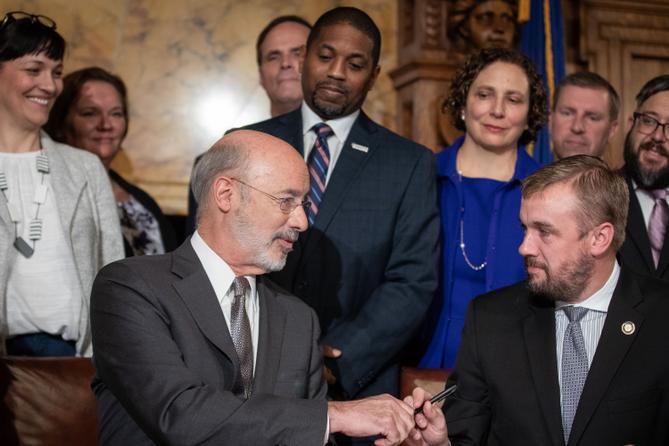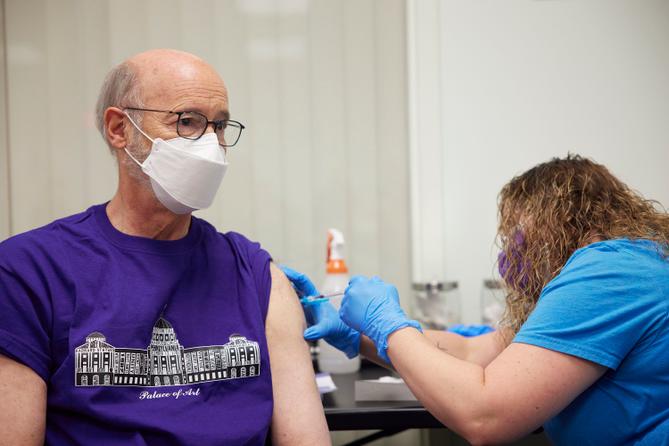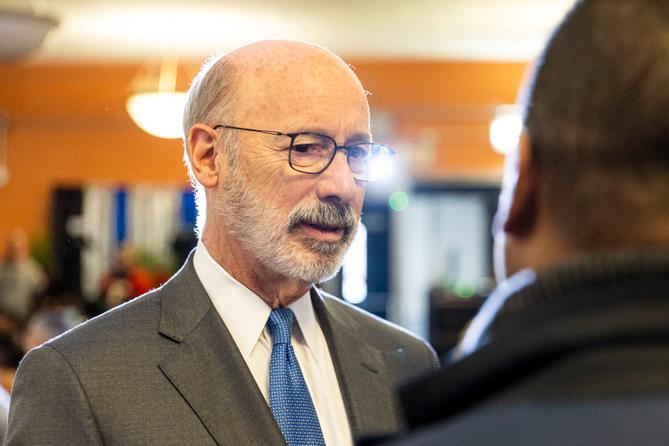Spotlight PA is an independent, nonpartisan newsroom powered by The Philadelphia Inquirer in partnership with PennLive/The Patriot-News, TribLIVE/Pittsburgh Tribune-Review, and WITF Public Media. Sign up for our free newsletters.
HARRISBURG — Gov. Tom Wolf began and ended his eight years in the state’s top job with the same mantra: He was not a conventional politician.
Talk to his allies and opponents, and that reputation rings true in at least one way: The Democrat never demonstrated the enthusiasm for backroom dealmaking or hands-on horse-trading that some previous governors did.
“That part of the job was the thing he saw as a challenge,” said political observer and good-government advocate David Thornburgh, whose father was governor of Pennsylvania in the 1980s.
That approach, in many ways, served Wolf well.
As he prepares to hand the reins of government to Democrat Josh Shapiro, Wolf leaves behind a long list of policy wins, from boosting education funding to legalizing medical marijuana.
But complicating his legacy is the sense that policymaking in the Capitol often teetered on the edge of political brinkmanship. Wolf’s background as a successful businessman used to calling the shots, particularly early in his tenure, clashed with the reality that he had to negotiate with a legislature dominated by Republicans with opposing views. That dynamic only intensified as he tried to steer the state through life-or-death decisions during a once-in-generations pandemic.
His governing style — and personality — sometimes heightened that sense of uncertainty. More private than some of his predecessors, Wolf wasn’t one to dominate a dais, hold frequent news conferences or issue sweeping public pronouncements, a temperament that made it hard to predict what he would prioritize next or how far he would be willing to compromise to get it.
What few dispute, though, is that Wolf held firm to his convictions. He issued the second most vetoes of any governor since the 1970s, rejecting attempts to restrict abortion and LGBTQ rights and protecting his executive actions on issues like climate change.
“One thing I’ll say about Gov. Wolf, in my time with him, he was an honest broker,” said former Republican state Senate leader and President Pro Tempore Jake Corman. “If he said he would do something, he did it. That’s fair.”
Ed Rendell, a former Democratic governor known for his dealmaking, said that Wolf had a harder time working with the legislature. But he added that partisanship was extremely different during his time as Pennsylvania’s top executive.
“There is a huge difference between the years 2002 [to] 2010 and the years 2015 [to] 2023, and the difference is the Republican Party in my eight years as governor still was transactional,” Rendell said.
“The Republican Party today,” he continued, “basically doesn’t want government to function at all.”
In public statements over the years, legislative Republicans accused Wolf’s administration of having “no interest in fulfilling one of the most basic functions of their responsibility” when Wolf declined to haggle over a congressional map; disparaged his push to legalize recreational marijuana as “irresponsible”; and at one point, said his COVID-19 measures were canceling Christmas.
Corman conceded that the GOP has gotten more partisan in the past decade, but insisted Wolf was also “a little more ideological” than previous governors.
Still, talk to those who governed with Wolf now, and there are few lingering hard feelings.
“Those areas where we agree, we would work together,” House Republican Leader Bryan Cutler (R., Lancaster) said, “and where we didn’t, we had vigorous discussions. Sometimes in the public square, sometimes through legislation that was vetoed.”
“But I think at the end of the day, that’s exactly how government is supposed to work,” Cutler added.

Working with the legislature
Wolf, a 74-year-old wealthy scion of a cabinetmaker from York County, was first elected in 2014. He beat a crowded Democratic primary field by spending millions of his own dollars, then he bested incumbent GOP Gov. Tom Corbett on a platform of good government and education spending.
The first few years of his administration were defined by months-long budget impasses as Wolf pushed for higher taxes to close the state’s deficit and increase funding for public schools.
The Republican-controlled General Assembly shot those requests down.
There were “obviously a tough couple of years and a tough couple of budgets when the governor wanted significant tax increases and the legislature wasn’t going to do that,” said Corman, who became the state Senate majority leader just in time for Wolf’s first term.
In Corman’s opinion, Wolf’s initial senior staff — which included his primary opponents Katie McGinty as chief of staff and John Hanger as policy and planning secretary — didn’t serve him well as advisors because they took a combative approach to dealing with the deeply Republican legislature.
Still, in those first few years, Wolf signed laws that created the state’s medical marijuana program, brought wine sales into grocery stores, and shifted future state employees onto a hybrid pension/401(k) retirement plan.
The two sides found even bigger issues to work together on after a staffing shuffle, said Corman. Most importantly, Wolf brought in top advisors that included Mike Brunelle, who had served in the New Hampshire House of Representatives, and elevated longtime campaign operative Mary Isenhour to chief of staff.
“I think Mike came in with the idea, ‘Look, you know, the legislature has to pass any bill we want to sign, so let’s figure out a way to get along where we can,” Corman said. “I think after that transition happened, things got much better.”
Wolf signed more bipartisan deals in his second term, including one that set up a state-level health insurance marketplace and budgets that boosted the state’s education budget by $5.4 billion.
He also worked quietly with Republicans to create billions of dollars in tax credits to encourage the use of natural gas and attract a hydrogen hub to Pennsylvania. The action, which will likely be one of his last in office, capped a mixed record on the environment.
“He’s not only not been a champion, but he’s actually endorsed every kind of industry development, business development that only brings more fracking to Pennsylvania,” said Karen Feridun, executive director of the Better Path Coalition, a collective of pro-environment groups that advocates for renewable energy.
One of the most surprising and impactful deals Wolf helped cut with Republicans was Act 77, which instituted no-excuse mail voting and eliminated straight-ticket ballots.
Members of the governor’s own party seethed about the straight-ticket concession, with one lawmaker calling it a “betrayal of Democratic constituencies.”
“There were a lot of Democrats who were against giving up straight-ticket voting,” Wolf said in a December interview with Spotlight PA. “But I thought that what was on offer here from the Republicans was something that would increase turnout. We would actually increase access and make it easier to vote, and allow more people to actually take advantage of the franchise.”
Thornburgh, the former head of the good-government group Committee of Seventy, called Act 77 a “real accomplishment.”
After the first, pandemic-era primary election in which the new law was used, it became clear that counties needed more time to tabulate mail ballots ahead of Election Day — a common practice in states with widespread mail voting.
But talks between the legislature and Wolf collapsed ahead of the 2020 general election, and the days it took to count ballots and produce unofficial results became central to former President Donald Trump’s baseless claims of election fraud.
In the aftermath, some GOP lawmakers from Pennsylvania full-throatedly embraced Trump’s unfounded assertions that the election was stolen from him, and many members of the Republican caucuses pushed to delay the certification of the state’s results.
Wolf later vetoed a GOP omnibus election measure because it would have expanded voter ID requirements, and attempts to fix issues with the Election Code came to a halt.
“It takes two to tango,” Thornburgh said. “Each side is taking shots at the other, but that’s just maybe an inherent frustration of divided government in highly partisan times.”

An outside approach
Throughout his tenure, Wolf embraced executive powers and regulatory action that allowed him to accomplish policy goals that had no chance of winning the support of the Republican legislature.
Within his first month in office, he instituted a gift ban among executive employees — one so strict it prevented them from taking bottled water at public events — banned new drilling on millions of acres of state park and forest land, declared a moratorium on the death penalty, and expanded public health care coverage to hundreds of thousands of low-income Pennsylvanians.
He stretched his executive powers as far as they could go to respond to the spread of COVID-19, a disease that has claimed the lives of more than 49,000 Pennsylvanians to date. Wolf and his administration ordered schools closed, instituted mask mandates, and shuttered all but “life-sustaining businesses,” citing a mix of decade-old laws.
“This isn’t a decision that I take lightly at all,” Wolf said after issuing a statewide stay-at-home order in March 2020. “It’s one that I’m making because medical experts believe it is the only way we can prevent our hospitals from being overwhelmed by patients.”
He and his defenders argue he did what was necessary to protect public health, and health studies have suggested that lockdowns saved lives.
But his heavy reliance on executive actions, uneven business shutdowns, and poor communication around mitigation efforts took their toll on his already chilly relationship with the legislature. Other effects — including putting hundreds of thousands of Pennsylvanians temporarily out of work and learning loss among school-age children — will impact society for years to come.
“I’m going to be second-guessing myself until the day I die,” Wolf told Spotlight PA in December.
Beyond becoming a villain to grassroots activists furious at public health orders (someone paid for sky banners calling him a “nerd king”), Wolf’s decisions strained his relationship with the General Assembly.
He vetoed a large number of GOP bills that would have reduced his authority to control the pandemic response, from how realtors could do their job to mask mandates for student-athletes to vaccine requirements for public services.
Republicans responded with constitutional amendments, which can be passed without the governor’s say.
With some Democratic support, legislative Republicans put on the May 2021 ballot two amendments to limit Wolf and all future governors’ powers to call and sustain disaster declarations. Voters, who three years earlier reelected Wolf by 18 percentage points, narrowly backed both measures.
Cutler, a vocal critic of executive power who became state House speaker in 2020, said that Wolf would sometimes personally take his calls and listen to his advice. The Republican said he convinced Wolf to reopen truck stops during the pandemic and to allow small businesses selling farm supplies to be reclassified as “life-sustaining.”
“Sometimes [issues] were resolved very easily,” Cutler said, “and other times, you know, I understood that it was not personal, that we just simply disagreed on how to best manage some of those things.”
Wolf’s administration has also used the regulatory process to accomplish some of the governor’s priorities, including bringing the state into the Regional Greenhouse Gas Initiative to combat climate change. The program requires power plant owners to buy credits for every ton of carbon released into the atmosphere.
The Republican legislature, backed by trade unions that represent coal-fired power plant workers, tried to block it. But Wolf refused to back down, and even engaged in some rare political hardball to personally compel skeptical Democratic lawmakers to keep the program in place.
GOP lawmakers are now pursuing a constitutional amendment that would make it easier for the legislature to override such regulations.
The power of the pen
In some ways, the dozens of bills Wolf rejected during his time in office — more than 60 in all — were just as important to his legacy as those he signed.
He used his veto pen to block a proposed 20-week abortion ban, permitless concealed carry, and a sports ban that targeted transgender women and girls.
“I stuck to my guns on things like women’s rights and LGBTQ rights, civil rights, gun legislation — a lot of things that I stood up and did what I thought was right,” Wolf told Spotlight PA in December.
For advocates on these issues, Wolf’s steadfast loyalty was a breath of fresh air, said Tyler Titus, an Erie-based LGBTQ advocate. They highlighted Wolf’s appointment of Rachel Levine, who is transgender, as physician general and later secretary of health.
“He was the strongest ally to date,” Titus said, “and not just in showing up at parades in the month of June, but by putting in place policy and practices and appointing LGBTQ individuals so they are at the tables of power.”
Wolf also held tremendous power over the once-a-decade redrawing of the state’s political boundaries, rejecting a congressional map drawn by Republicans he said “failed the fundamental test of fairness.”
Rendell compared Wolf to former Philadelphia Flyers goalie Ron Hextall, saying that he used his veto pen “brilliantly” to keep “bad things from happening.”
“I think people don’t give Tom Wolf enough credit for being involved in things. He didn’t do it in public … he didn’t do it as visibly as I did,” Rendell said. “But I wouldn’t dismiss his role in the nuts and bolts of government.”
WHILE YOU’RE HERE… If you learned something from this story, pay it forward and become a member of Spotlight PA so someone else can in the future at spotlightpa.org/donate. Spotlight PA is funded by foundations and readers like you who are committed to accountability journalism that gets results.

